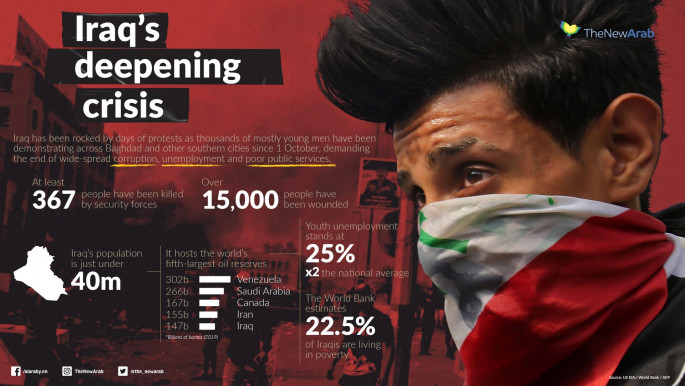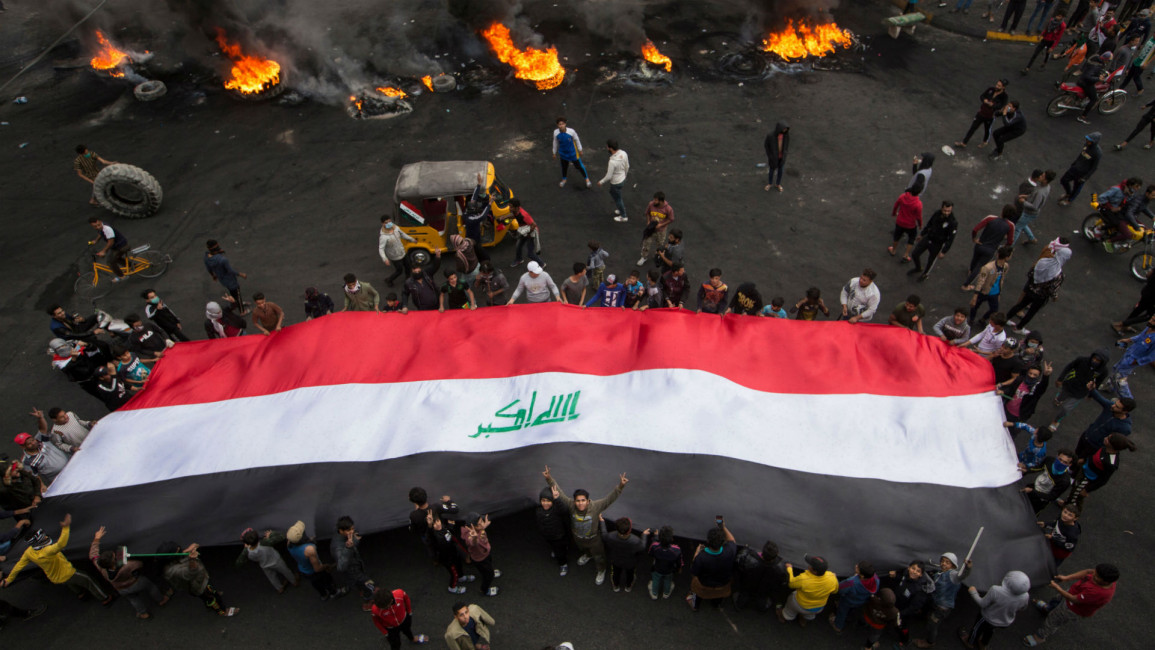Top Iraq cleric Sistani urges cabinet change after bloody 'protester massacre'
Iraq's top Shia cleric on Friday urged parliament to replace the cabinet, after dozens of protesters were killed in one of the bloodiest days of anti-government rallies gripping the country.
Grand Ayatollah Ali Sistani's weekly sermon gave a major boost to Iraqi demonstrators who have been taking to the streets since early October against a ruling class deemed corrupt and inefficient.
The grassroots movement is the largest Iraq has seen in decades but also the deadliest, with nearly 400 people dead and more than 15,000 wounded in the capital and Shia-majority south, according to an AFP tally.
For weeks, Sistani has called for restraint in dealing with demonstrators and has urged political parties get "serious" about reform, but he ramped up demands on Friday.
"The parliament, from which this current government is drawn, is asked to reconsider its choice in this regard," he said in the sermon delivered by a representative.
Within minutes, MP and former premier Haider al-Abadi called on lawmakers to convene Saturday for a "special session for a vote of no-confidence and to form a new independent government".
| |
Lawmakers from parliament's largest bloc, Saeroon, said they would go to their offices on Friday, which is normally a day off, to plan an "immediate" no-confidence vote.
And Qais al-Khazaali, head of the powerful paramilitary faction Asaib Ahl al-Haq, tweeted: "Your commands will be ours, too."
'Bloodbath'
The sudden turnaround came after one of the bloodiest days of protests yet, with 44 demonstrators killed and nearly 1,000 wounded on Thursday in a government crackdown on rallies.
The bulk of the dead, 26, fell in the southern protest hotspot of Nasiriyah, where thousands hit the streets to mourn them on Friday.
Large crowds also gathered in the city's main squares to demand the government step down, burned tyres to block highways leading north and torched another police station in the city.
Five protesters suffered bullet wounds in confrontations outside Nasiriyah's main police headquarters, according to medics.
In Baghdad, where two demonstrators died on Thursday, protesters dug into their main camp at Tahrir (Liberation) Square despite skirmishes with security forces.
And in the shrine city of Najaf, a massive funeral procession wound its way through the streets carrying coffins of some of the 16 people killed there the previous day.
The unrest in Iraq's south was unleashed after protesters stormed the Iranian consulate in Najaf late on Wednesday, accusing the neighbouring country of propping up Iraq's government.
Tehran demanded Iraq take decisive action against the protesters, saying it was "disgusted" by developments.
In response, Prime Minister Adel Abdel Mahdi ordered military chiefs to deploy in several provinces to "impose security and restore order" - but chaos reigned instead.
Men in civilian clothes opened fire at demonstrators and tribal fighters deployed in the streets in their defence.
As the death toll climbed late Thursday, the premier sacked the commander he had dispatched to Nasiriyah and the provincial governor based in the city resigned.
Police officers speaking on condition of anonymity told AFP they had received orders Thursday to "finish off" the rallies, but the heavy bloodshed put a halt to those plans. 
'A war zone'
The violence was condemned worldwide, with Amnesty International saying the scenes resembled "a war zone".
"This bloodbath must stop now," said Lynn Maalouf of the London-based rights group.
Baghdad and the south have been rocked by the most widespread street unrest since the 2003 US-led invasion that toppled Saddam Hussein.
Protesters are seeking an overhaul of the ruling elite, accused of corruption and embezzling state funds in a country scarred by decades of conflict and where infrastructure is failing.
Iraq is OPEC's second-largest crude producer but one in five Iraqis lives in poverty and youth unemployment stands at 25 percent, according to the World Bank.
Demonstrators have also called out Iraq's large eastern neighbour Iran, accusing it of political, economic and military overreach.
The two predominantly Shiite countries have close but complex ties and Tehran holds significant sway among Iraqi political and military leaders.
Top Iranian commander Qasem Soleimani has held several meetings in Baghdad and Najaf to try to convince political factions to close ranks around Abdel Mahdi.
Those meetings, sources told AFP, brought firebrand cleric Moqtada Sadr back into the fold after he had called on the embattled premier to resign.
But as the tide appeared to turn again for the premier, Sadr resurfaced Thursday, saying it would "be the beginning of the end for Iraq" if the government did not step down.
Follow us on Twitter and Instagram to stay connected


![President Pezeshkian has denounced Israel's attacks on Lebanon [Getty]](/sites/default/files/styles/image_684x385/public/2173482924.jpeg?h=a5f2f23a&itok=q3evVtko)



 Follow the Middle East's top stories in English at The New Arab on Google News
Follow the Middle East's top stories in English at The New Arab on Google News


